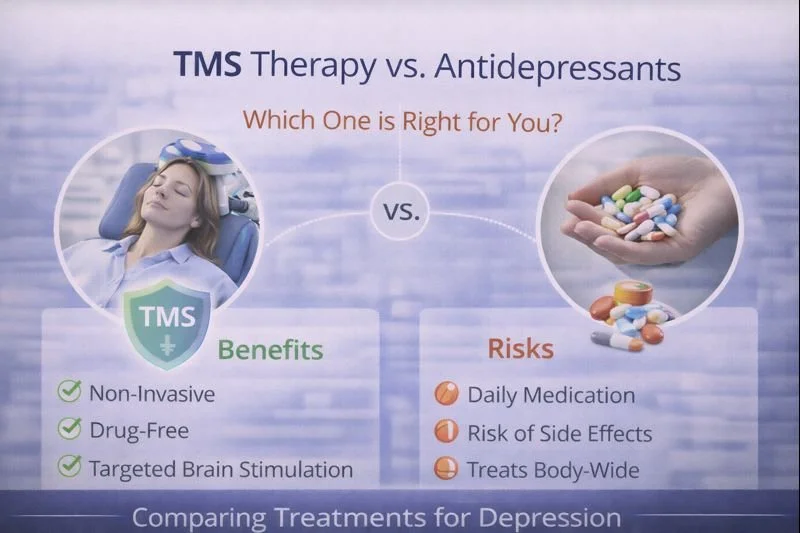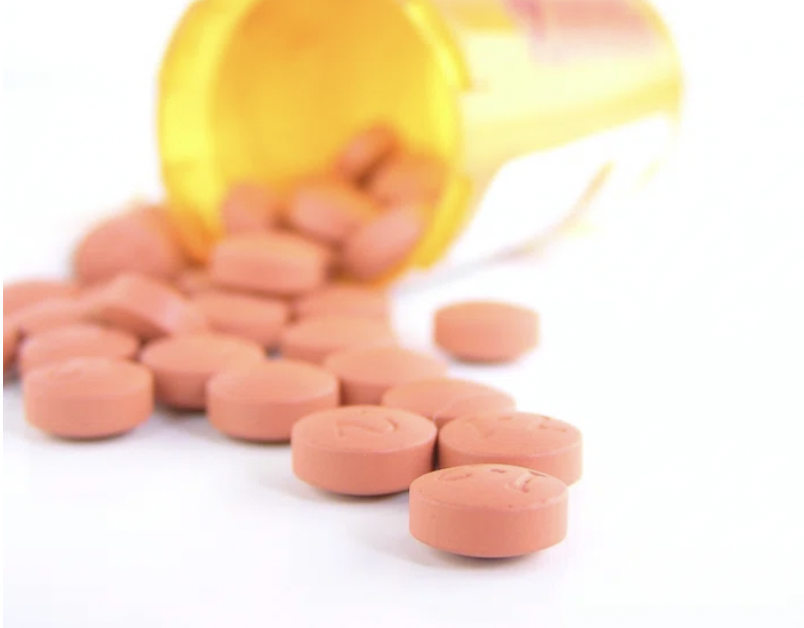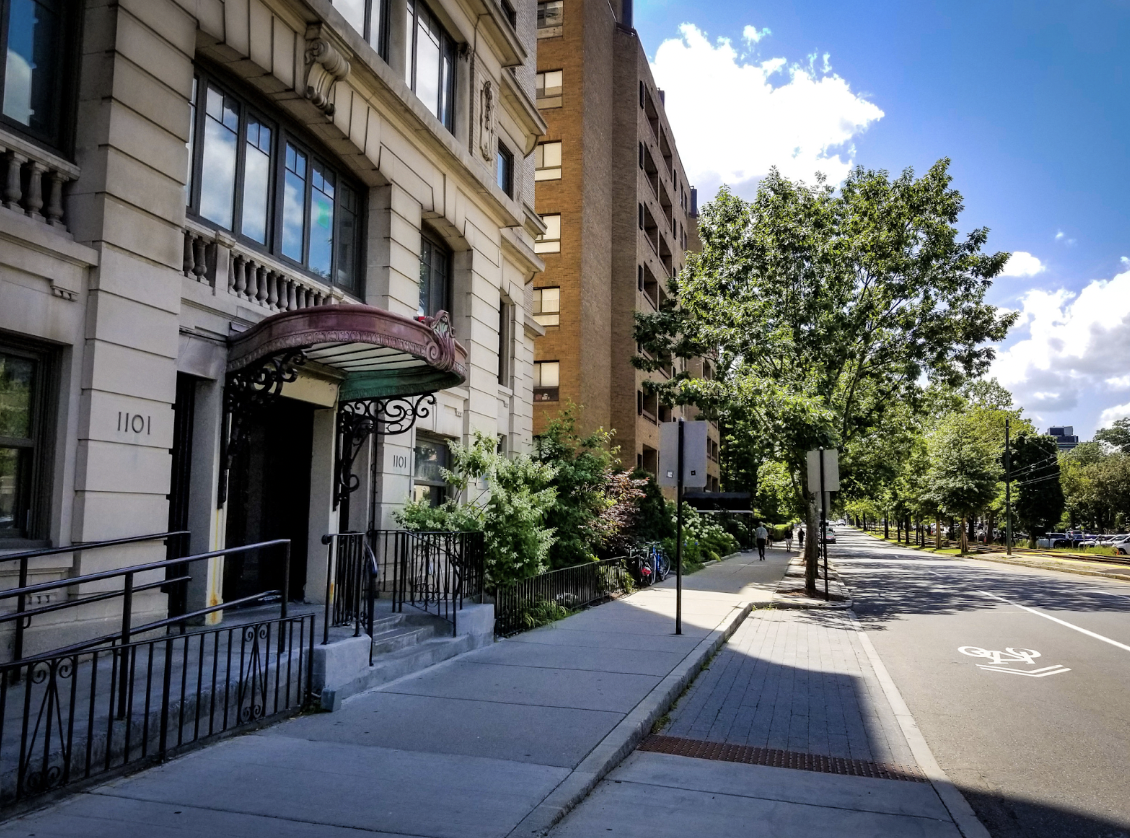TMS Therapy vs. Antidepressants: Which One Is Right for You?
Understanding Your Treatment Options for Depression in Boston
If you're struggling with depression, you may be considering different treatment options. Many people rely on antidepressant medications, while others explore innovative approaches like Transcranial Magnetic Stimulation (TMS) therapy. But how do you know which treatment is best for you?
If you're searching for "TMS therapy in Boston" or wondering about "Boston TMS specialists," you're in the right place. In this guide, we’ll compare TMS therapy and antidepressant medications to help you make an informed decision about your mental health care.
What Is TMS Therapy?
TMS (Transcranial Magnetic Stimulation) is a non-invasive, FDA-approved treatment for depression that uses magnetic pulses to stimulate areas of the brain associated with mood regulation. This therapy is especially beneficial for individuals who haven't responded well to antidepressant medications.
How TMS Therapy Works
A TMS device delivers magnetic pulses to targeted brain areas.
These pulses help activate neural pathways involved in mood regulation.
Sessions are typically 20–40 minutes long and occur five days a week for 4–6 weeks.
Patients remain awake and alert during the procedure.
There are minimal side effects compared to medications.
If you're searching for the "best TMS treatment near me" in Boston, there are many highly qualified specialists and clinics available to provide this cutting-edge therapy.
What Are Antidepressants?
Antidepressants are prescription medications used to treat depression by balancing neurotransmitters in the brain. They are often the first line of treatment for individuals experiencing moderate to severe depression.
Common Types of Antidepressants
Selective Serotonin Reuptake Inhibitors (SSRIs) – e.g., Prozac, Zoloft, Lexapro
Serotonin and Norepinephrine Reuptake Inhibitors (SNRIs) – e.g., Effexor, Cymbalta
Tricyclic Antidepressants (TCAs) – e.g., Amitriptyline, Nortriptyline
Monoamine Oxidase Inhibitors (MAOIs) – e.g., Nardil, Parnate
These medications are typically taken daily and may take several weeks to show full effects.
Comparing TMS Therapy and Antidepressants
Effectiveness
TMS Therapy: Effective for treatment-resistant depression, especially for those who haven’t responded well to medication.
Antidepressants: Effective for many patients but may require multiple trials to find the right medication and dosage.
Side Effects
TMS Therapy: Minimal side effects, primarily mild headaches or scalp discomfort.
Antidepressants: Potential for weight gain, sexual dysfunction, drowsiness, nausea, and increased risk of suicidal thoughts in young adults.
Convenience
TMS Therapy: Requires in-office sessions multiple times per week but no daily medication.
Antidepressants: Requires daily medication adherence and routine follow-ups with a prescribing physician.
Long-Term Outcomes
TMS Therapy: Benefits can last for months or years after treatment, often reducing or eliminating the need for medication.
Antidepressants: Ongoing use may be required for sustained symptom management, and some people may need lifelong treatment.
Who Should Consider TMS Therapy?
TMS therapy may be the right choice if you:
Have not responded to at least two antidepressants.
Experience unpleasant side effects from medication.
Prefer a non-medication approach to treating depression.
Want a long-term solution that doesn’t require daily medication management.
Have been researching "Where can I get TMS therapy in Boston?" and are interested in learning more.
Who Should Consider Antidepressants?
Antidepressants may be the better option if you:
Are experiencing depression for the first time and haven’t tried medications yet.
Prefer a more accessible and cost-effective treatment option.
Do not have significant side effects from medications.
Have mild to moderate depression and need flexibility in your treatment plan.
***
🌟 Looking for TMS Therapy Near You? Where to Get TMS Therapy for Depression in Boston
📍 Conveniently located near:
✅ Boston, Cambridge, Newton, Alston, Somerville, & Back Bay
Dignity Brain Health - TMS Therapy Clinic
💡 Why Choose Dignity Brain Health for TMS?
✔️ Expert Boston TMS Specialists – Harvard Medical School-trained; Treating depression with TMS since 2017.
✔️ Personalized Treatment Plans – Tailored to your unique mental health needs.
✔️ Insurance-Friendly Process – We handle the paperwork for you.
✔️ Proven Results – TMS can improve symptoms for patients who haven’t responded to medication.
📅 Take the First Step Toward Relief
👉 📆 Find Out If TMS Is Right for You; Book Your TMS Consultation Now (Insurance-Covered)
💬 Still have questions? Contact us today and speak with a specialist about whether TMS therapy is right for you!
***
🌍 Mental Health Resources in Boston for Depression & TMS Therapy
If you or a loved one are struggling with depression, these trusted resources in Boston offer professional support:
🔹 Massachusetts General Hospital Psychiatry Department – Offers psychiatric evaluations, therapy, and medication management for depression and anxiety.
🔹 Boston University Center for Psychiatric Rehabilitation – Specializes in mental health recovery programs, vocational rehabilitation, and outpatient services.
🔹 Samaritans Boston (Suicide Prevention) – A free 24/7 crisis helpline offering confidential emotional support.
Dignity Brain Health is committed to helping patients find the best mental health care in the greater Boston area.
References
Mayo Clinic. (2022). Antidepressants: Selecting one that's right for you. Retrieved from https://www.mayoclinic.org/diseases-conditions/depression/in-depth/antidepressants/art-20046273
Miller, M.C. (2012). Magnetic stimulation: a new approach to treating depression? Harvard Health. Retrieved from https://www.health.harvard.edu/blog/magnetic-stimulation-a-new-approach-to-treating-depression-201207265064
National Institute of Mental Health. (2024). Depression. Retrieved from https://www.nimh.nih.gov/health/publications/depression#part_6159
—
CONTACT INFO:
DIGNITY BRAIN HEALTH
1101 BEACON STREET, SUITE 8W
BROOKLINE, MA, 02446
UNITED STATES
Phone: (617) 855-7288




